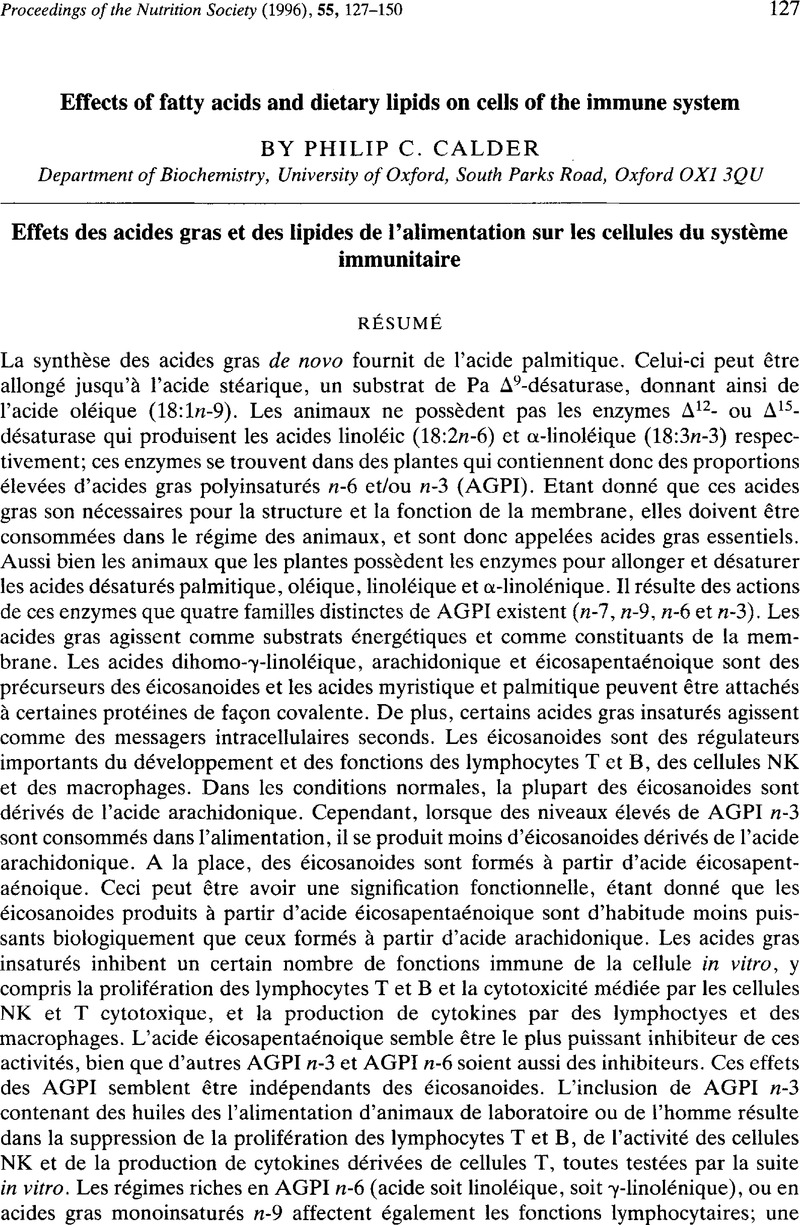Crossref Citations
This article has been cited by the following publications. This list is generated based on data provided by Crossref.
Calder, Philip C.
1996.
Immunomodulatory and anti-inflammatory effects of n-3 polyunsaturated fatty acids.
Proceedings of the Nutrition Society,
Vol. 55,
Issue. 2,
p.
737.
Jeffery, N. M.
Sanderson, P.
Sherrington, E. J.
Newsholme, E. A.
and
Calder, P. C.
1996.
The ratio of n‐6 to n‐3 polyunsaturated fatty acids in the rat diet alters serum lipid levels and lymphocyte functions.
Lipids,
Vol. 31,
Issue. 7,
p.
737.
Jeffery, Nicola M.
Cortina, Mario
Newsholme, Eric A.
and
Calder, Philip C.
1997.
Effects of variations in the proportions of saturated, monounsaturated and polyunsaturated fatty acids in the rat diet on spleen lymphocyte functions.
British Journal of Nutrition,
Vol. 77,
Issue. 5,
p.
805.
Scherer, John M.
Stillwell, William
and
Jenski, Laura J.
1997.
Spleen Cell Survival and Proliferation Are Differentially Altered by Docosahexaenoic Acid.
Cellular Immunology,
Vol. 180,
Issue. 2,
p.
153.
Jeffery, Nicola M
Sanderson, Peter
Newsholme, Eric A
and
Calder, Philip C
1997.
Effects of varying the type of saturated fatty acid in the rat diet upon serum lipid levels and spleen lymphocyte functions.
Biochimica et Biophysica Acta (BBA) - Lipids and Lipid Metabolism,
Vol. 1345,
Issue. 3,
p.
223.
Calder, Philip C.
1998.
Dietary fatty acids and lymphocyte functions.
Proceedings of the Nutrition Society,
Vol. 57,
Issue. 4,
p.
487.
Jenski, Laura J.
Scherer, John M.
Caldwell, LaDawn D.
Ney, Victori A.
and
Stillwell, William
1998.
The triggering signal dictates the effect of docosahexaenoic acid on lymphocyte function in vitro.
Lipids,
Vol. 33,
Issue. 9,
Calder, Philip C.
1998.
Medicinal Fatty Acids in Inflammation.
p.
1.
Peterson, L. D.
Jeffery, N. M.
Thies, F.
Sanderson, P.
Newsholme, E. A.
and
Calder, P. C.
1998.
Eicosapentaenoic and docosahexaenoic acids alter rat spleen leukocyte fatty acid composition and prostaglandin E2production but have different effects on lymphocyte functions and cell‐mediated immunity.
Lipids,
Vol. 33,
Issue. 2,
p.
171.
Miles, Elizabeth A.
and
Calder, Philip C.
1998.
Modulation of immune function by dietary fatty acids.
Proceedings of the Nutrition Society,
Vol. 57,
Issue. 02,
p.
277.
Otton, Rosemari
Graziola, Fabiana
De Souza, José A. A.
Curi, Tânia C. P.
Hirata, Mário H.
and
Curi, Rui
1998.
Effect of dietary fat on lymphocyte proliferation and metabolism.
Cell Biochemistry and Function,
Vol. 16,
Issue. 4,
p.
253.
Sanderson, Peter
and
Calder, Philip C.
1998.
Dietary fish oil appears to prevent the activation of phospholipase C-γ in lymphocytes.
Biochimica et Biophysica Acta (BBA) - Lipids and Lipid Metabolism,
Vol. 1392,
Issue. 2-3,
p.
300.
Kearns, Robert J
Hayek, Michael G
Turek, John J
Meydani, Mohsen
Burr, John R
Greene, Robert J
Marshall, Craig A
Adams, Scott M
Borgert, Robert C
and
Reinhart, Gregory A
1999.
Effect of age, breed and dietary omega-6 (n-6):omega-3 (n-3) fatty acid ratio on immune function, eicosanoid production, and lipid peroxidation in young and aged dogs.
Veterinary Immunology and Immunopathology,
Vol. 69,
Issue. 2-4,
p.
165.
Bonin, Arnaud
and
Khan, Naim Akhtar
2000.
Regulation of calcium signalling by docosahexaenoic acid in human T-cells: implication of CRAC channels.
Journal of Lipid Research,
Vol. 41,
Issue. 2,
p.
277.
Simonson, Shawn
2000.
Nutrition and the Strength Athlete.
Vol. 20004050,
Issue. ,
p.
175.
Tomobe, Yoko I.
Morizawa, Kazuya
Tsuchida, Mamoru
Hibino, Hidehiko
Nakano, Yoshio
and
Tanaka, Yukihisa
2000.
Dietary docosahexaenoic acid suppresses inflammation and immunoresponses in contact hypersensitivity reaction in mice.
Lipids,
Vol. 35,
Issue. 1,
p.
61.
Calder, P.C
2001.
N-3 polyunsaturated fatty acids, inflammation and immunity: pouring oil on troubled waters or another fishy tale?.
Nutrition Research,
Vol. 21,
Issue. 1-2,
p.
309.
Bassaganya-Riera, Josep
Hontecillas, Raquel
Zimmerman, Dean R.
and
Wannemuehler, Michael J.
2001.
Dietary Conjugated Linoleic Acid Modulates Phenotype and Effector Functions of Porcine CD8+ Lymphocytes.
The Journal of Nutrition,
Vol. 131,
Issue. 9,
p.
2370.
Calder, Philip
2001.
Food and Nutritional Supplements.
p.
175.
Denys, Anne
Hichami, Aziz
and
Khan, Naim Akhtar
2001.
Eicosapentaenoic acid and docosahexaenoic acid modulate MAP kinase (ERK1/ERK2) signaling in human T cells.
Journal of Lipid Research,
Vol. 42,
Issue. 12,
p.
2015.



